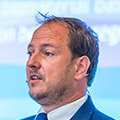Jens Thies, PhD, MBI, Senior Science Fellow, DSM Biomedical, Geleen, The Netherlands
Abstract: Humanity measures its history in material ages. In ancient times medical practitioners were forced to use natural materials occurring in the environment around them, such as silks and animal tissues (e.g. bones). As humanity passed into the Bronze Age, metal surgical tools enabled medical practitioners to practice more complex medical procedures. 20th century biomedical engineers were likewise forced to use the materials readily available at the time and largely borrowed from other industries. It wasn't until the middle of the 20th century that biomedical professionals and medical engineers began to use synthetic biomaterials in order to create modern medical devices. Bespoke biomaterial (materials designed for medical implants) emerged even more recently.
The greatest challenge faced by medical engineers in the 21st century is sustainability. We should think about sustainability, not only in terms of financial sustainability of the health care system (health care economics), but also in terms of the environmental burden put on the planet for future generations by the healthcare industry as it is today.
In this paper we present a brief historical view of medical procedures from natural materials through to the beginnings of synthetic biomaterials and discuss perspectives for the future in terms of sustainability and efficacy. We will do so by illustrating these with examples of DSM’s biostable polyurethanes and polyethylene platforms and a biodegradable polyesteramide platform suitable for sustained and local release of active pharmaceutical ingredients.
Biography: Jens Thies received his PhD from Heriot Watt University in Edinburgh in 1998 for his research into the optical properties of chiral liquid crystalline polymers. Subsequently he undertook post-doctoral positions at DSM Research (Netherlands) and California Institute of Technology (Caltech) on recombinant protein engineering. He joined DSM Performance Materials Research in 2001 and initiated the Functional Coating Innovation platform which became DSM’s Advanced Solar Business Unit (recently divested to Covestro).
Jens is an inventor of more than 45 patent families and has successfully lead products development in several DSM businesses including: Functional Materials, Solar, Medical Coatings and Drug Delivery. He is currently the global lead scientist within DSM Biomedical as Senior Science Fellow. Jens also holds an Executive Masters in Business Innovation from TIAS Business School (2010).










.jpg)
.jpg)
.jpg)

.jpg)
